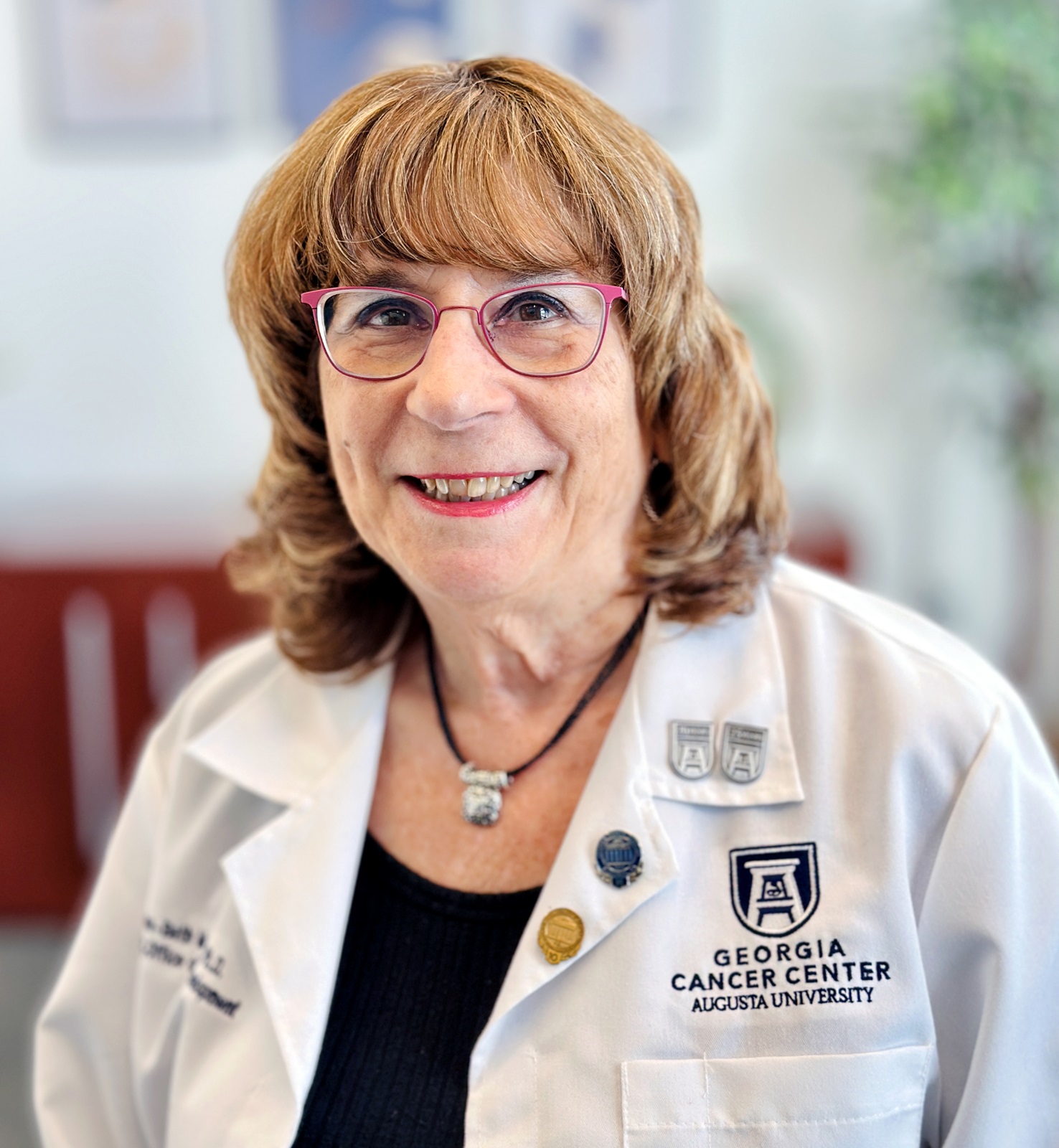
- Augusta University
- Georgia Cancer Center
- Research
- Grant Support Services
Grant Support Services
The Georgia Cancer Center provides dedicated support to its researchers for the writing and submission of extramural and intramural grant applications.
Office of Grant Administration
The Grants Administration Office supports all pre-award and post-award activities of faculty within the Georgia Cancer Center and assists them in preparing their applications for submission, including development of budgets, as well as managing their awards.
The Office of Grant Development assists faculty within the Georgia Cancer Center with preparation of the scientific and text sections of grant proposals.
Meet Our Team

Rhea-Beth Markowitz, PhD
- Director, Grant Development
- Office: CN 2210
706-721-7916

Office of Grant Administration
The Office of Grants Administration supports all pre-award and post-award activities of faculty within the Georgia Cancer Center and assists faculty in preparing applications for extramural support, including the development of their budgets.
Geno Clark assists with internal Augusta University routing, budget development, and other administrative documents. His office is committed to assisting submission of proposals according to sponsor and institutional requirements in a timely fashion. Kay Smith assists in new award setup, monthly tracking of costs on sponsored projects relative to their budgets, ensuring expenses meet sponsor and institutional guidelines, progress reports, effort reporting for personnel, cost-share accounts as needed, cost transfers when required, no-cost extensions when needed, and grant/contract closeout when the grant is terminated.
The team's goal is to make the administrative aspects of proposal submission and award management as efficient as possible so scientists can focus maximum effort on writing the science of their proposals and achieving the specific aims of their awards.
Office of Grant Development
The Office of Grant Development assists Georgia Cancer Center faculty with preparation of the scientific and other text sections (e.g., biosketches, facilities) of grant applications (extramural and intramural) for grammar, syntax, logic, clarity, transitions, and correct English phrasing.
Please let Dr. Rhea-Beth Markowitz know in advance you will be submitting a grant to her for editing so she can plan accordingly. Grants may be submitted in hard copy or electronically. There is no fee for this service.
Dr. Markowitz periodically presents grant writing seminars that focus on how to write an NIH R01 type of grant. She is also available, upon request, for teaching Scientific Writing classes, with particular emphasis on writing for non-native English speakers. Recent grant writing and scientific writing lectures can be accessed and reviewed at your convenience (see right sidebar).
The Office of Grant Development also assists in the preparation of Georgia Cancer Center institutional and multi-institutional grant applications and program project proposals.
Writing Resources
Additional Tips for NIH Grant Submissions
Don’t Forget to Link Your ORCID iD to Your eRA Commons Profile
We encourage everybody from graduate students to senior scientists to register for an ORCID account and link it to their eRA Commons personal profile. Starting October 1, 2019, ORCID identifiers will be required for individuals supported by institutional research training, career development, and other research education awards. ORCID iDs will also be required for PD/PIs on individual fellowship and career development applications submitted for due dates on or after January 25, 2020.
The Do’s & Don’ts of Hyperlinks in Grant Applications
- Do include hyperlinks when explicitly requested in application guide, funding opportunity, or NIH Guide notice instructions
- Do use hyperlinks in relevant citations and publications included in biosketches and publication list attachments
- Do NOT use hyperlinks anywhere else in your application
At the end of the day, risk avoidance may be the most convincing reason to avoid unrequested hyperlinks. NIH may withdraw your application from consideration if you include them. Don’t risk it. Write a compelling, self-contained grant application and let it speak for itself.
Clarifying Long-Standing NIH Policies on Disclosing Other Support
Who funds your current research? Make sure to let NIH know. It is required.
Institutions and investigators must disclose all forms of what is termed “other support” when applying for and receiving NIH grants. Other support includes all resources, regardless of whether or not they have monetary value, available in direct support of an individual’s research endeavors.
So, do you need to report those other NIH grants you have? Yes. What about a contract from another federal agency? Yes. Grants or contracts that go through another institution, including institutions in foreign countries? Yes. Commercial funds? Yes. Domestic or international positions held by senior/key personnel? Yes. In kind lab or office space? Yes. Scientific materials? Yes. Even if it has no monetary value? Yes. Affiliations (even if described as honorary or adjunct) with foreign entities or governments, including talents programs? Yes.
Applicants are reminded they must promptly notify NIH if previously submitted just-in-time information is substantively changed prior to award or at the time of the progress report, which could lead to budgetary, scientific, or commitment overlap.
Sample Grant Applications, Summary Statements, and More
If you are new to writing grant applications, sometimes seeing how someone else has presented their idea can help as you are developing your own application. With the gracious permission of successful investigators, the National Institute of Allergy and Infectious Diseases (NIAID) makes available examples of funded R01, R03, R15, R21, SBIR/STTR, K, and F applications, summary statements, sharing plans, leadership plans, and more.
Check out the NIAID’s Sample Applications and More.
When referencing these resources, it is important to remember:
- These applications were developed using the application forms and instructions that were in effect at the time of their submission. Forms and instructions change regularly. Read and carefully follow the instructions in the funding opportunity announcement to which you are responding and the current application instructions carefully.
- The best way to present your science may differ substantially from the approach taken by those who wrote the example applications. Seek feedback on your draft application from mentors and others.
- Talk to an NIH program officer in your area of science for advice about the best type of grant program and the Institute or Center that might be interested in your idea.
My resubmission of a competing renewal application (Type 2 A1) was not funded. May I submit a new renewal (Type 2 A0)?
No. Only a single resubmission of a competing new, revision, or renewal application (A0) will be accepted. After a resubmission of a competing renewal (Type 2) application that is not funded, a subsequent new renewal (Type 2 A0) application may not be submitted. The next application submitted on this topic should be submitted as a new application (Type 1 A0) on an appropriate due date for new applications (see NOT-OD-18-197 for exceptions).
Additional Resources
Researcher's Toolbox
This is a “one-stop resource shop” for GCC Researchers. We provide numerous resources for you to use as you write your grants: the official GCC Grants Process, descriptions about our facilities (e.g., AU, GCC, shared resources, physical and intellectual environment), where to find NIH grant documents and instructions, and much more.
Health Research Associates
This outside consulting group provides assistance with writing of specific aims, hypothesis development, and reviewer critiques through the Augusta University Research Institute.
Extramural Grant Review
Researchers can request a review of their extramural grant application by a nationally or internationally recognized senior scientist in the appropriate field. Funds for this are provided by the Division of Sponsored Program Administration.
Augusta University Resources Repository
The Augusta University Resources Repository contains up-to-date descriptions of facilities available at AU to assist faculty in the writing and preparation of their grant proposals.